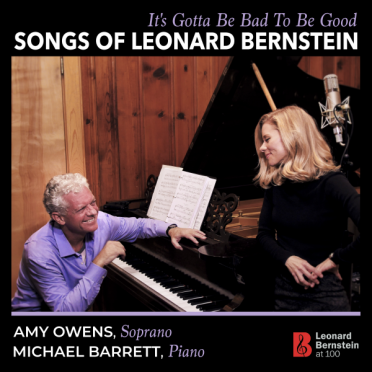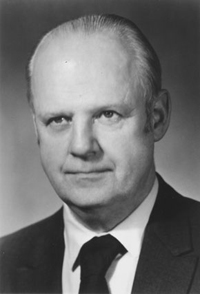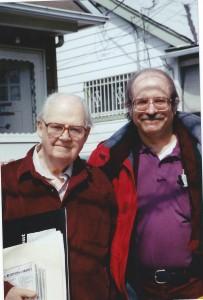2 Revivals (Blitzstein, Weill), 2 CDs (Bernstein, Palmer) and A Look At Lorca (NYFOS), by Leonard Lehrman
Comments Off on 2 Revivals (Blitzstein, Weill), 2 CDs (Bernstein, Palmer) and A Look At Lorca (NYFOS), by Leonard LehrmanMay 21, 2019 by Admin

2 Revivals (Blitzstein, Weill)
2 CDs (Bernstein, Palmer)
And A Look At Lorca (NYFOS)
by Leonard Lehrman

The Cradle Will Rock à la John Doyle
The Classic Stage revival of Marc Blitzstein’s masterpiece, The Cradle Will Rock, which ran from March 21 thru May 19 at the Lynn F. Angelson Theater on East 13 Street was John Doyle’s latest reductionist effort in the area of classic American musical theatre and his first time staging work by Marc Blitzstein. One hopes it will not be the last: There are so many other Blitzstein works equally worthy of his attention, including Regina, Juno, and (as mentioned later in this article) No for an Answer, Idiots First and Sacco and Vanzetti, along with his version of the Brecht-Weill Mahagonny. Cradle, inspired by and dedicated to Bertolt Brecht, could hardly be timelier today; the actors were good and full of energy; the directorial concept… interesting.
In 2005, when John Doyle stripped Stephen Sondheim’s 1979 musical thriller Sweeney Todd of its mammoth sets, and pared its cast and orchestra down to 10 instrument-playing singers, his production lost much of the romantic lushness of the piece, but presented its bare-boned structure in a mostly convincing way. With this Cradle, also performed by ten actors, four of them accompanying the piano (sometimes four-hands), he has in many ways returned the piece to the form in which it was first presented to the public in 1937: with the composer at a piano onstage and cast members doing their parts impromptu from various parts of the audience—that was in reaction to the federal government’s censoriously having locked them out of their theater and the actors’ and musicians’ unions’ scandalous lack of cooperation in presenting this ultimate paean to the virtues and powers of “unionism.” (See my New Music Connoisseur review of the most recent production, with orchestra, conducted by John Mauceri, posted here: http://ljlehrman.artists-in-residence.com/PoliticalMusicalTheatre.html).
Actually, “socialism” was the not-so-subtle message of the original piece, and now that Bernie Sanders and AOC have made that term not so much a dirty word anymore today, it’s time to acknowledge that the character of Ella Hammer (Rema Webb), who invariably steals the show with “Joe Worker Gets Gypped,” is the counterpart to the hero Larry Foreman, whose name was originally “Larry Sickle.”
In this production, everyone but the formidable David Garrison as Mr. Mister – the tycoon who owns and/or buys everything and everyone in Steeltown USA – got to play at least 2 or even 3 parts. This made for a tight community statement; and Tony Yazbeck is a wonder, both as Larry (in Scenes 7-10) and as Harry, the common man (in Scenes 2-5) who is transformed from mortgage-addled druggist to determined sympathizer with the coming strike (aka the “storm,” code for the Revolution). Unfortunately, the interchange between those two characters was consequently cut here, resulting in the loss of some of the most contemporarily relevant dialog of the whole piece: Children of the various unions (roughers, rollers, boilermakers) each have different instruments (drums, flutes, bugles), but are silent until the union vote comes in. Why? “Mister, that’s discipline,” says one little boy. And that’s what seems to be missing here.
Greg Jarrett is listed as “Music Supervisor,” but the piece needs musical direction, especially the finale, in which the appearance of all those instruments in the score – or at least music for them, at the piano – was cut, apparently for convenience. Larry screams out: “The roughers! The rollers!” as the music of their instruments is heard. But here it was not heard. At the talkback April 16, I decried this, shouting: “Put it back! Or the last scene makes no sense!” (Did they? I don’t know.)
The actors had been given free rein to improvise movement and occasionally cut lines essential to the structure, such as Rev. Salvation (Benjamin Eakeley)’s “Thou shalt not kill,” which truncates as profits quickly change peacetime to wartime in 1915-1917. That Mission Scene was actually inspired by a scene in the Paul Green-Kurt Weill Johnny Johnson (1936), which was the first Weill piece Blitzstein liked, and reviewed favorably. Instead of that verbal truncation, we saw the reverend groveling before, and even going down on, Mrs. Mister (Sally Ann Triplett). We were also treated to the literal groveling for cash of nearly all the actors, and splits and cartwheels of Kara Mikula as a quasi-genderless football coach in the College Scene. Dr. Specialist’s ominously percussive pencil was gone. And the fist of solidarity before the final blackout was missing, and missed. But it was worth the price of admission just to hear Tony Yazbeck intone the chant “USA,” bringing the 1937 play up to date, or at least up to 9/11.

Lady in the Dark at City Center
Johnny Johnson was not the success that Cradle became, and Kurt Weill was rumored to have referred to the latter while going around town saying “Have you seen my latest show?” In my 1970 interview with Weill widow Lotte Lenya, she poutingly asserted: “Oh! Kurt would never do that,” but Lys Symonette, who was present at said interview, later affirmed to me that “Of course he did.”
Weill’s greatest debt to Blitzstein was of course the 1954 translation/adaptation of his and Brecht’s Threepenny Opera (1928), written for and starring Lenya. But another work of Weill’s, the 1941 Lady in the Dark, began as a vehicle for another actress, Katharine Cornell (1893-1974), based on playwright/director Moss Hart’s personal experience with psychotherapy. After Weill and lyricist Ira Gershwin came on board (in Ira’s first outing following the death of his brother George), the music took over the play, necessitating the engagement instead of British music hall star Gertrude Lawrence, along with an incidental boost to a Catskills entertainer named Danny Kaye (né Kaminsky) who stole the show with a patter song listing Russian (and some non-Russian) composers, based on a 1924 poem by Ira called “The Music Hour.” (Thomas Smith performs it here – https://www.youtube.com/watch?v=9YeRbaJnFvc).
That the score was at least quasi-operatic in scope was made evident in a standard-setting production, and LP (Columbia COS 2390), with Risë Stevens, Adolph Green and John Reardon in the major roles.
MasterVoices, formerly known as the Collegiate Chorale, spared no effort in bringing the piece to City Center, alas for just 3 performances, April 25-27, with Ted Sperling both conducting and directing, and his favorite soprano Victoria Clarke exulting in the title role. The sumptuous costumes, sets, and choreography were backed by full orchestra and a chorus of over 100, probably larger than the piece ever had before. As was the case in the York Theatre’s recent revival of Carmelina, reviewed here last March, the role of the psychiatrist was re-assigned to an actress, in this case the laconic veteran, Amy Irving. Ben Davis, Ron Raines and David Pittu (in the Danny Kaye role) acquitted themselves in the male leads. The entire event was an obvious labor of love; the adaptation was by Kurt Weill Foundation President Kim Kowalke and Moss Hart’s son Christopher; and Ruby Sperling Waxman and Emma Hart, daughters of Ted and Chris, obviously enjoyed their child roles on stage. My own connection to Chris was at Harvard: when we were both undergraduates, I asked him to direct my production of The Cradle Will Rock, which he considered for a few months, but then declined; so I ended up directing it myself, in 1969. That’s when John Miner (who conducted Johnny Johnson at Harvard) mentioned it to Leonard Bernstein, who responded: “I’m glad somebody at Harvard still has taste!”

NYFOS’ Look at Lorca
Bernstein and Blitzstein were of course the inspiration and impetus for the New York Festival of Song: its directors, pianists Steven Blier and Michael Barrett, began their collaboration, with Bernstein, at the Marc Blitzstein 80th Birthday Concert of 1985. (Barrett also became Bernstein’s assistant conductor, after music-directing John Houseman’s 1983 revival of The Cradle Will Rock.) What NYFOS has done since then is truly remarkable, with Blier’s extensive program notes and introductions a perennial treat at each successive concert. Their literature announces a double-bill next Nov. 19 of Weill’s Silverlake and Blitzstein’s No for an Answer, not heard in New York since 1960, a piece I completed part of, and have been trying to get done here since music-directing backers’ auditions for it with Maggie da Silva in 1988!
The April 24 presentation at Merkin Hall program had a 9-month gestation period to research and study works in collaboration with and/or inspired by the Spanish poet Federico Garcia Lorca (1898-1936), who, like Blitzstein, was both a Communist and (mostly) homosexual, and was tragically murdered, in Lorca’s case by Franco’s fascists near the beginning of the Spanish Civil War. The program, sung by capable soprano Corinne Winters and baritone Efrain Solis, accompanied effectively by guitarist Oren Fader with occasional percussion (Leonardo Granados) and Barrett and/or Blier at the piano(s), began with three of Lorca’s own arrangements, moving on to children’s songs on his texts by Mompou, Revueltas and others, and then more substantial compositions by, among others, de Falla, Ohana, Bolcom, Surinach, Paul Bowles, Billy Strayhorn and Leonard Cohen.
Not included was one of my favorite poems by Lorca, “Dawn in New York,” which I set to music back in 1981, and, I just learned, was also set by one of my teachers, Leon Kirchner, back in 1943! Lorca was also the inspiration for a group of 3 Elegies by Antonio Machado, the musical setting of which was one of the first successful compositions by my first teacher, Elie Siegmeister (1909-1991), performed at the 1939 NY World’s Fair and many times since, though not since his death, until baritone Michael Niemann sang it at a concert on Elie’s 110th birthday, here – https://youtu.be/1_GmzTaY4Gw.
Barrett’s & Owens’ Bernstein CD
 Following the concert, I was pleased to be gifted Michael Barrett’s latest CD, produced and engineered by Adam Abeshouse, with soprano Amy Owens, entitled “Songs of Leonard Bernstein,” though it actually includes half a dozen piano solos (“Anniversaries”) as well, concluding with the amusing combination of the Jule Styne melody “Just in Time” superimposed on the opening of Bach’s Well-Tempered Clavier and entitled “Bridal Suite: Prelude.” This piece, and all the Anniversaries, are available on Andrew Cooperstock’s New Bridge CD, reviewed here in Aug. 2017 – see http://www.soundwordsight.com/2017/08/honoring-the-upcoming-leonard-bernstein-centennial-a-review-of-his-complete-solo-works-for-piano-on-new-bridge-records-cd/.
Following the concert, I was pleased to be gifted Michael Barrett’s latest CD, produced and engineered by Adam Abeshouse, with soprano Amy Owens, entitled “Songs of Leonard Bernstein,” though it actually includes half a dozen piano solos (“Anniversaries”) as well, concluding with the amusing combination of the Jule Styne melody “Just in Time” superimposed on the opening of Bach’s Well-Tempered Clavier and entitled “Bridal Suite: Prelude.” This piece, and all the Anniversaries, are available on Andrew Cooperstock’s New Bridge CD, reviewed here in Aug. 2017 – see http://www.soundwordsight.com/2017/08/honoring-the-upcoming-leonard-bernstein-centennial-a-review-of-his-complete-solo-works-for-piano-on-new-bridge-records-cd/.
Owens’ singing is accurate, persuasive and compelling; the repertoire is familiar, except for an unpublished wordless solfège and two versions of a song with an original Bernstein text on becoming a grandfather. Three songs from Peter Pan are included, though not the one Blitzstein is reputed to have rewritten, often praised as the most beautiful song Bernstein ever wrote: “Dream With Me.” There are numerous versions of that piece, of course, including one which Steve Blier gave me with cello, flute, chorus, etc. When I asked him how he played it when accompanying with piano alone, he said “Differently every time.” Which is how I do it too, with soprano Helene Williams – most recently here – https://youtu.be/vFFuuUFCzTA.
 Adam Tendler’s Palmer CD
Adam Tendler’s Palmer CD
In 2002, just before Helene & I were married, six composers were writing music for our wedding, including my teacher at Cornell, Robert Palmer (1915-2010). He left a message on our answering machine that he had searched and searched and finally found the right (“Jewish”) mode in which to write our piece, but then he had a stroke. We spent our honeymoon in Ithaca, found him in bed on the wrong medication, demanded that it be changed, and were told later we had saved his life. We visited him every summer thereafter until his death, 8 years later.
Two years ago, the talented, energetic young pianist Adam Tendler corresponded with me about doing a CD of Palmer’s piano music, similar to the CD of Marc Blitzstein’s solo piano music I had recorded in 2005, which finally came out on Toccata Classics this past February. (See the review by London Times critic Geoff Brown in Classical Source, here: http://www.classicalsource.com/db_control/db_cd_review.php?id=16411).
Tendler’s project was also long in the works, beginning about 10 years ago; though it was 20 years ago, he told me in a telephone interview, that he first encountered Palmer’s “Toccata Ostinato,” which can be accurately characterized as “a boogie-woogie in 13/8 time!” After playing that piece numerous times as an encore on concerts, and receiving plaudits for it more than just about anything else, he found himself confronted with the question: “Who was Robert Palmer?” and started researching the answer online, in recordings, scores, and correspondence, especially at Cornell, but also in the Yale collection of pianist John Kirkpatrick, who had worked for several years with Palmer at Cornell, before Yale.
 Robert M. Palmer was a pupil of Aaron Copland, Roy Harris and Quincy Porter, and created the first D.M.A. gradate program for composers in the U.S. – at Cornell. His style was rigorously tonal, but with frequent use of the octatonic scale (whole step followed by half step, yielding 8 tones to the octave, instead of the traditional diatonic 7) and often rhythmically complex. Among his pupils were the microtonalist Ben Johnston (1926- ), Brian Israel (1951-86), and two Pulitzer Prize winners: Steven Stucky (1949-2016) and Christopher Rouse (1949- ). His catalog includes 90 works, many of them unperformed/unpublished, few of them heard recently. The militantly political Vachel Lindsay poem, “Abraham Lincoln Walks at Midnight,” which both he and Elie Siegmeister set to music in 1939-1948, brought them together; and Siegmeister recommended many of his students to Palmer, including Herbert Deutsch, Jack Gallagher, Daniel Dorff, and this writer.
Robert M. Palmer was a pupil of Aaron Copland, Roy Harris and Quincy Porter, and created the first D.M.A. gradate program for composers in the U.S. – at Cornell. His style was rigorously tonal, but with frequent use of the octatonic scale (whole step followed by half step, yielding 8 tones to the octave, instead of the traditional diatonic 7) and often rhythmically complex. Among his pupils were the microtonalist Ben Johnston (1926- ), Brian Israel (1951-86), and two Pulitzer Prize winners: Steven Stucky (1949-2016) and Christopher Rouse (1949- ). His catalog includes 90 works, many of them unperformed/unpublished, few of them heard recently. The militantly political Vachel Lindsay poem, “Abraham Lincoln Walks at Midnight,” which both he and Elie Siegmeister set to music in 1939-1948, brought them together; and Siegmeister recommended many of his students to Palmer, including Herbert Deutsch, Jack Gallagher, Daniel Dorff, and this writer.
As a teacher, Palmer was quite amazing, able to imitate a student’s style and make constructive suggestions of possible alternate compositional directions that might be pursued. He could also be quite demanding, but almost invariably supportive. I’ll never forget when I had qualms about accepting the very strenuous job of Metropolitan Opera Assistant Chorus Master, right after graduate school; he peered at me through his glasses and said gently, but firmly: “You were never afraid of hard work.”
Tendler’s resulting CD (New World 80809-2) is a first-class piano portrait of Palmer, not chronological, but with an emotional arc that encompasses the aforementioned Toccata (1945); the first two of his three Piano Sonatas (1938, rev. 1946; 1948); 3 (of 13!) Epigrams (1957-58); 3 Preludes (1941); the complementary Morning Music & Evening Music (1971, 1956); his tribute to retiring Cornell President Dale Corson, Transitions (1977); and finally Interrupted Tango (1984), a quasi-jazz piece and a favorite of Palmer’s son-in-law David Plaine, himself a pop musician. Joseph Kubera joins as second pianist in the 1944 Sonata for 2 Pianos, which recalls the stoic, hearty gestures of Palmer’s best known chamber work, the 1947 First Piano Quartet, arguably the best work in that medium by any American composer (including Copland!).
Not included are the Third Sonata (1979) and Ballade (1996-97, which is not in the online list of his works either) that he wrote respectively for and in memory of pianist Ramon Salvatore (1945-96). Perhaps that’s because the proofs of the former (on which I had extensive correspondence with Palmer, who pronounced himself “overwhelmed”) may never have been completed. There’s also a delightful 4-movement Sonata for 4 Hands (1952, rev. 1957) – which was published, but full of errors. I have just finished proofing and correcting it, and hope to be able to play and perhaps record it soon – with Adam!
Delighted that he was able to take some time out from his busy teaching and concert schedule to speak with me, I was also pleased at the praise he lavished on my performance of Palmer’s Transitions (a few seconds faster than his!) at my 50th birthday concert, Aug. 20, 1949 – posted here: https://youtu.be/7ic6cXevCbI.
Palmer attended that concert and afterwards came to our house and listened to my completion of Act I of Marc Blitzstein’s self-styled magnum opus, the opera Sacco and Vanzetti. In the most complex portion of the opera, Scene 3, he sat down with me and played it 4-hands, as he had with Blitzstein himself in Rome in 1960. He then wrote the Blitzstein Estate, encouraging them to commission me to effect a completion of the entire opera, which I did, and then dedicated to him. You can watch him talking about it at the Aug. 2001 premiere, here: https://youtu.be/uGSCldyrsgE – and, you can read about and watch the whole opera here: http://ljlehrman.artists-in-residence.com/SaccoAndVanzetti.html.
When Opera News published a diatribe against the opera by Joel Honig, who had attended the symposium but no performance of the work, a “Storm of Protest” letters (their words) was sent to them, including one by Palmer, posted here:
http://ljlehrman.artists-in-residence.com/NMCv10no1ltr.html.
It’s short enough, I think, to merit reprinting here in its entirety:
November 16, 2001
Dear Mr. Driscoll:
Mr. Honig’s article in your November issue, full of rampant inaccuracies, goes well beyond the boundaries of ethics and common decency, in an apparent attempt to destroy the work and sully the integrity of a number of American musicians. How can he pretend to be able to judge a work he neither saw nor heard? And how could OPERA NEWS be a party to such slander?
I experienced a similar incident many years ago when a work of mine was performed in New York. It was to have been reviewed by Olin Downes, a very well known critic for the Herald Tribune. I was bitterly disappointed when he left at intermission, since my work was in the second half. I was absolutely outraged when a negative review of my work appeared in the next morning’s paper under his name.
Having been a consultant and advisor for both Marc Blitzstein and Leonard Lehrman, I was invited to speak at the August 18 symposium on the recently completed Blitzstein/Lehrman opera, SACCO AND VANZETTI, and spoke for all of about 5 minutes. Mr. Honig’s insulting characterization of my talk is way out of line. Leonard Lehrman’s remarks were both informative and supportive. His assertion that he “attacked” Anton Coppola is outrageous as is the rest of his diatribe. OPERA NEWS should be ashamed of having printed it.
Sincerely,
Robert M. Palmer, Given Foundation Professor of Composition Emeritus, Cornell University
Palmer would be gratified today, I think, to learn of the new attention and respect accruing to his music, as well as that of his friend Marc Blitzstein.
LEONARD LEHRMAN worked with Leonard Bernstein and Robert Palmer on completing Marc Blitzstein’s Idiots First and Sacco and Vanzetti, respectively. Helene Williams and Thomas Smith will premiere 4 of his songs at Court Street Music in Valley Stream June 9. He and Helene will be performing in Ann Arbor, MI and Madison, WI June 27-28, and in Roslyn and Oyster Bay with The Metropolitan Philharmonic Chorus and Dakule Trio. This is his 20th article for SoundWordSight.com. Website: ljlehrman.artists-in-residence.com.
Category Sight, Sound, Word | Tags:
Comments Off on 2 Revivals (Blitzstein, Weill), 2 CDs (Bernstein, Palmer) and A Look At Lorca (NYFOS), by Leonard Lehrman
Sorry, comments are closed.


